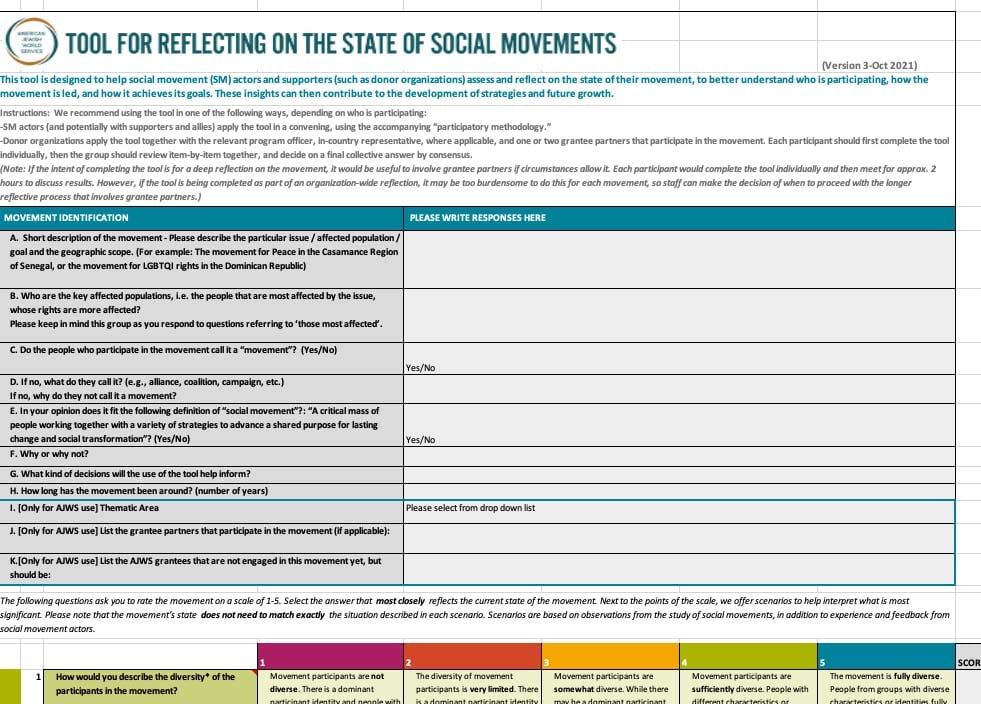AJWS defines a social movement as a critical mass of people working together with a variety of strategies to advance a shared purpose for lasting change and social transformation. Historically, autonomous and progressive social movements have played a crucial role in advancing policies that affirm human rights, increasing the political power of marginalized groups and challenging harmful social norms.
A tool for reflecting on the state of social movements:
In order to support social movements effectively, it’s critical to understand these movements—including their base, structure and strategy. To do so, AJWS developed a tool for reflecting on the social movements in which our grantees engage. By comprehensively identifying and reflecting on the movements that we indirectly support, we hoped to increase our understanding of our grantees’ work and develop and strengthen our funding strategies.
We developed an initial version of the AJWS Social Movement Tool in 2016, produced by a working group of our staff who have substantial experience as social movement actors or grantmakers supporting social movements, and/or who hold expertise in research and evaluation. The group’s work was informed by a review of the existing literature on social movements and insights from a first draft of the Movement Capacity Assessment Tool developed by Global Fund for Women. Since then, AJWS’s tool has gone through an iterative development process, informed by feedback from social movement actors and experts, as well as statistical factor analysis and an extensive literature review.
The tool is an important reflection instrument for organizations that fund social movements. It also serves social movement actors, who can use the tool to reflect on the state of their movements and to better understand who is participating, how the movement is organized and led, and how it strategizes to advance its agenda. The tool is not meant to evaluate a movement, but rather provide a framework for social movement actors and supporters to take stock of the state of the movement and facilitate systematic reflection—assessing different aspects that contribute to the strength of the movement and the achievement of its goals—to inform strategy development.
We believe the discussions and insights that have emerged from engaging with the tool have meaningfully informed our strategy development as well as the movements that we have supported in using it. We invite you to test it out and share your own learnings.
How the tool can facilitate your learning:
This tool is designed to help social movement (SM) actors and supporters—such as donor organizations—assess and reflect on the state of their movement in order to better understand who is participating, how the movement is led and how it achieves its goals. These insights can then contribute to the development of strategies and future growth. We recommend using the tool in one of the following ways, depending on who is participating:
- SM actors (potentially with supporters and allies) apply the tool in a facilitated convening, using participatory methods.
- Donor organizations apply the tool together with the relevant program officer(s), in-country representative(s)—where applicable—and one or two grantee partners that participate in the movement. Each participant first completes the tool individually, then the group reviews each item together and decides on a final collective answer by consensus.
We have been piloting a participatory methodology for use of the tool and have held five convenings with grantee partners and/or funders. This methodology will be available for sharing.
Fill out this form to receive a copy of the methodology and any other new and related resources when they are released.
Using the tool to assess three characteristics of successful social movements:
The AJWS Social Movement Tool is focused on assessing each movement according to the characteristics of successful social movements:
- BASE: To gain power and momentum, social movements need a critical mass of diverse participants, including those most affected by the issue at hand, who believe the overall movement—its mission, leaders, tactics, etc.—is credible and worthy of their involvement.
- STRUCTURE: To authentically engage and represent participants and ensure sustainability, social movement leaders need to foster democratic communication and coordination practices and support other people directly affected by the issue to take on meaningful decision-making and leadership roles.
- STRATEGY: To create lasting change, social movements need to have clear, collective agendas, engage influential people and allied groups and strategically use a variety of tactics—research, coalition building, demonstrations, communications, advocacy, litigation, etc.—in a responsive, timely manner.
Wondering whether this tool is for you? Consider reflecting on this resource from ORS Impact: Not Always Movements
Considerations for human rights funders engaging with social movements:
With more than 30 years of experience supporting grassroots activists and social movements in the Global South to advance social justice, American Jewish World Service has learned important lessons about how to provide this support in the promotion of human rights.
Read more about our top 10 considerations for human rights funders interested in supporting social movements.
Join our ongoing conversation:
If you are interested in using the AJWS Social Movement Tool or have any questions, please reach out to Margo Mullinax, Director of Strategic Learning, Research and Evaluation, at mmullinax@ajws.org.
As this work evolves, we look forward to updating you on our progress and opportunities to access additional tools and resources.
Sign up to download the tool
You will also receive updates from AJWS on future iterations of the tool and other resource releases.
